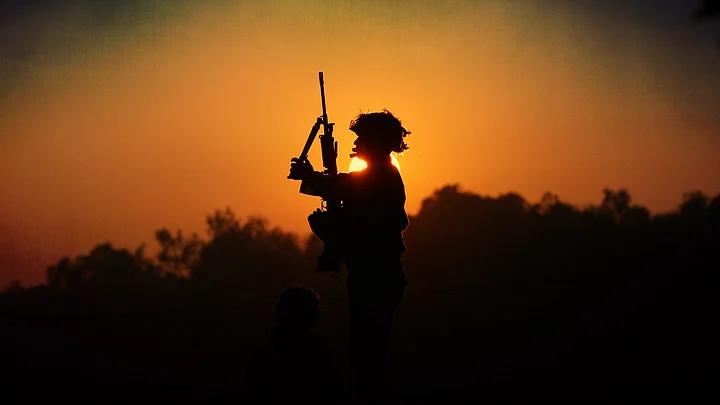- Defence analysts vouching for proactive military action are forgetting that it will mean full-fledged war, which is unpredictable and expensive.
- Carrying out covert military operations in Pakistan will mean that India becomes the perpetrator, not victim of terror.
- Prevent another Pathankot by remaining vigilant against both internal and external enemies.
- The entire Pak Army is not against normalisation of relations between the two nations.
- As far as Modi’s visit to Pakistan is concerned, it must take place as scheduled.
Proactive Military Action Will Prove Expensive
The Jaish-e-Muhammad fidayeen attacks on Pathankot airbase on 2 January have evoked ill-informed reactions, betraying immaturity to comprehend strategic realities. Defence analysts are screaming for proactive military action, meaning that you carry out trans-border raids on training centres and staging posts of terrorists in Pakistan.
But you can not do this unless you are prepared for a full-fledged war, which will cost a huge number of lives. Besides, you have no idea of how it will end and whether or not nuclear arsenals will be emptied. You are not Israel, nor are you dealing with Palestinians. Such is the world military equation today that even Russians cannot attack Turkey to avenge the downing of its military aircraft.
Let’s stop talking of military adventurism. It is true that more of our security personnel are getting killed than terrorists, but in any defensive war, casualties are always disproportionately higher for those at the receiving end. What then we must do is to make the border security impregnable and get in the habit of trusting inputs of intelligence agencies – however insipid and laughable they may appear – and take follow-up measures. The Pathankot attack clearly illustrates the lapse in following up the leads, seriously and assiduously.
An Impractical Alternative
As an alternative to military action, security experts are making a strong pitch for covert operations, suggesting that we train agents and push them inside Pakistan to destroy Pak defence installations and engineer blasts. They want the agencies to hit Pakistan so hard that it realises the depth of pain that goes with sending terrorists in India on suicide missions.
This idea is maddening. If you practice this, you will be branded not a victim but a promoter of terrorism with far reaching, adverse consequences for your economy, your defence preparedness and your quest to be counted in the comity of nations. The only way you can prevent another Pathankot is by remaining eternally vigilant against both your internal and external enemies.
Confused, Ill-Informed Political Discourse
Meanwhile, political commentators have made outrageous remarks. Some say caustically that Prime Minister Modi has been back stabbed by Nawaz Sharif within a week of hosting him over tea. Others maintain that if he has to talk, he should instead talk to Raheel Sharif, Army Chief in Rawalpindi.
They argue that notwithstanding former ISI’s chief’s meeting with the NSA in Bangkok, Pak Army would never allow its politicians to compromise on military support to Kashmiri separatists and creating instability in India through terrorist operations, no matter how much Delhi humours the civilian leadership. Hence, they want Delhi to freeze all interactions with Islamabad for next several years and PM to cancel his forthcoming talks with Nawaz Sharif.
To believe that the entire Pak Army establishment is against normalisation of relations is not wholly correct. It is true that majority of rank and file who were radicalised during General Zia-ul-Haq’s rule are still inimical to India but the way to neutralise them is to keep them engaged in dialogue. The communication must not end with only Janjua’s meeting with NSA but opportunities should be created for top level officers of the Defence Forces of the two nations to meet and exchange their concerns freely and frequently.
Modi Must Visit Pakistan
As far as PM Modi’s visit is concerned, it must take place. If nothing else, it will at least give him an opportunity to confront Sharif and question him on why he had to invite him over tea when plans were afoot to attack Pathankot air base. An embarrassed Sharif will surely pour his heart out about what went wrong. This will also make Sharif’s political life difficult if he has conspired with the Army to hurt us strategically, as our hawkish experts would like us to believe.
Finally, in an operation of this nature, politicians must avoid making brave and inaccurate claims about casualties and the nature of the operation. It is also inadvisable to indict the Pak Army unless we can prove conclusively the handler’s connect with them. It is true that such attacks will not take place without the active assistance of Pak Army, but mere suspicion will show us only as cry babies. Let evidence speak for our charges, only then we will be taken seriously.
We Must Not Exhibit Panic
We must also refrain from exhibiting panic. There was no need for our Foreign Minister’s brainstorming session at this time with ex-foreign Secretaries and former High Commissioners to Pakistan. It sends wrong signals all around. Such discourses produce only a cocktail of outdated ideas and add confusion to the decision-making process. It is saner that you trust your men in harness and encourage them to break the logjam that bedevils India and Pakistan relations.
(The writer is a former Special Secretary, Cabinet Secretariat)
(At The Quint, we question everything. Play an active role in shaping our journalism by becoming a member today.)
